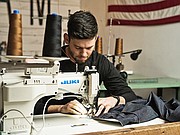MANUFACTURING
Billiam Jeans: Building High-End Denim One Jean at a Time
On a recent weekday afternoon, denim loyalists trickle into a small store in a nondescript strip shopping center in Greenville, S.C. They’ve come to be measured and fitted for custom-made jeans or they are anxiously waiting to pick up their finished product.
This is a regular occurrence at Billiam Jeans, brainchild of 29-year-old entrepreneur Bill Mitchell, who, as a senior at Clemson University back in 2009, discovered he had a penchant for making tailored clothing. The shop doubles as Billiam’s factory, where Mitchell and his lone employee laboriously churn out top-quality jeans at the rate of about one pair per hour, although they have produced pairs in as little as 38 minutes.
At $250 a pair, Billiam’s jeans aren’t for everyone. As Mitchell describes his clientele, they might be consumers who like locally made products and don’t mind paying extra. Or they’re well heeled with the means to buy the most expensive designer jeans but instead choose to pay for the experience of buying tailored jeans. There are some who can’t afford to make a snap decision to buy Billiam jeans but save up for the experience. Some are minimalists who would rather spend more on one high-quality pair rather than having an array of lower-quality commodity jeans cluttering their closet.
“We like to show people how they are made,” Mitchell said about the concept of having the factory share space with the retail operation. “Our mindset is that if a pair of jeans costs $250, people are going to know why it costs $250. We show them exactly how many machines it takes to make one pair of jeans (15) and how each machine is different. Some are brand new and do wonderful things, and some are from the 1940s and are historic.”
In addition to his shop, Mitchell sells Billiam jeans online and to wholesalers serving boutique shops mostly in the Southeast. Billiam has also gone international with eight stores in the U.K. carrying the jeans and stores in South Korea and Japan selling them as well.
Mitchell sources his denim from Greensboro, N.C.–based Cone Mills. The company is one of the few remaining mills making denim fabric in the U.S. and the only producer of selvage denim. Selvage fabric has self-finished edges and is made on vintage looms. Cone uses old Draper looms to make the fabric at its White Oak mill. Mitchell turned to Cone about five years ago after initially purchasing denim from Liberty Denim, which closed in 2012.
The relationship with Cone has evolved over time, and Mitchell works with the manufacturer to sample new materials. In fact, Mitchell’s affinity for Cone’s denim is so great that he purchased the company’s entire library of vintage sample rolls, which took three tractor-trailer loads to bring to Greenville. These five-yard remnants allow Billiam customers to pick out different styles for their customized jeans.
Mitchell embraces the historic aspect of Cone and its noisy old looms, saying they help tell the “history of American manufacturing.” He also notes that Billiam uses stretch denim made by Cone on modern looms with recycled materials.
Customization is a key to Billiam’s thriving business. Customers can bring in a picture of a pair of jeans or an old pair of jeans and Mitchell can replicate it. Sometimes the preferred fit and style can be found off the shelf in the store, but tailoring is the usual route.
“Our goal is to find something that fits,” Mitchell said. “If it fits immediately, that’s awesome. If it doesn’t fit, we can build one that fits.”
Billiam customers are loyal. Mitchell describes the experience as taking a customer and creating a friend by giving them an experience they enjoy. Many come back to buy a second or third pair.
Preferring to keep production numbers private, Mitchell said Billiam produced “thousands” of pairs of jeans in 2016, but he notes that production usually ranges from 50 to 150 pairs a week. Production has consistently grown by about 30 percent each year, he said. Mitchell augments his staff with college interns during the summer and says he may also soon add two full-time employees. His current space has room to double in size, and he expects to expand soon.
Mitchell buys Cone denim in 1,000-yard or 2,000-yard rolls at a time, depending on demand. He offers 300 different kinds of material, with about 70 percent being some type of indigo. He also stocks denim in black, gray, white, brown and green.
The jeans journey started during Mitchell’s Clemson days when he noticed how a friend’s clothes fit so well. He asked him where he bought his clothes. His response was that he used a sewing machine in his basement to tailor all of his clothes.
“So I thought, ‘That’s interesting,’ and I started doing the exact same thing,” Mitchell recalled. I found that I was pretty good at altering clothes. It’s much like putting together puzzles or Legos. I enjoy solving the problem. Then, after I tailored a ton of clothes, I decided I wanted to make some jeans from scratch.”
Mitchell bought a pattern for a pair of jeans, made that first pair, wore it around for a while, and within a year’s time had a waiting list of about 400 people wanting him to make them a pair. So began Billiam Jeans.






















